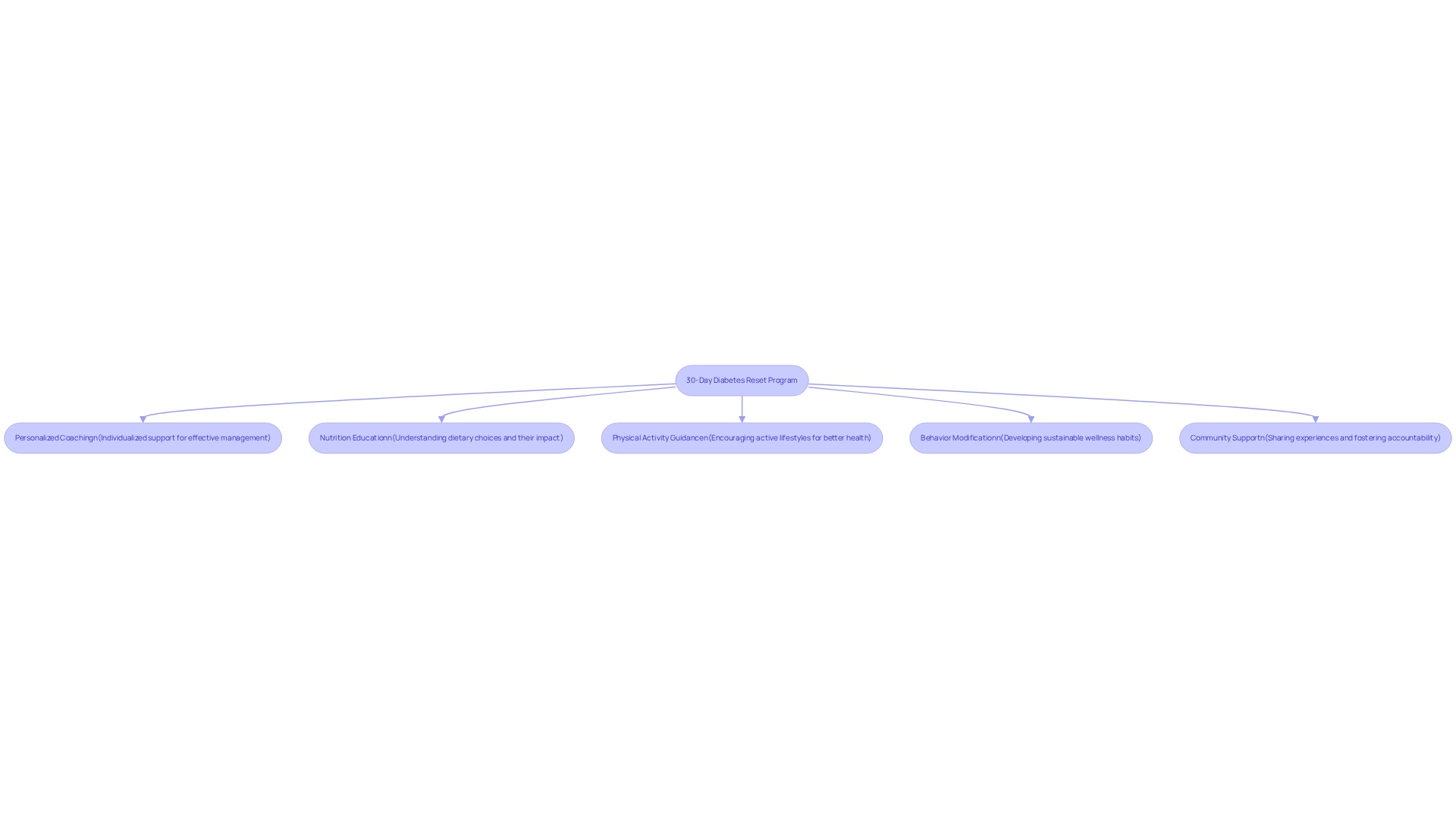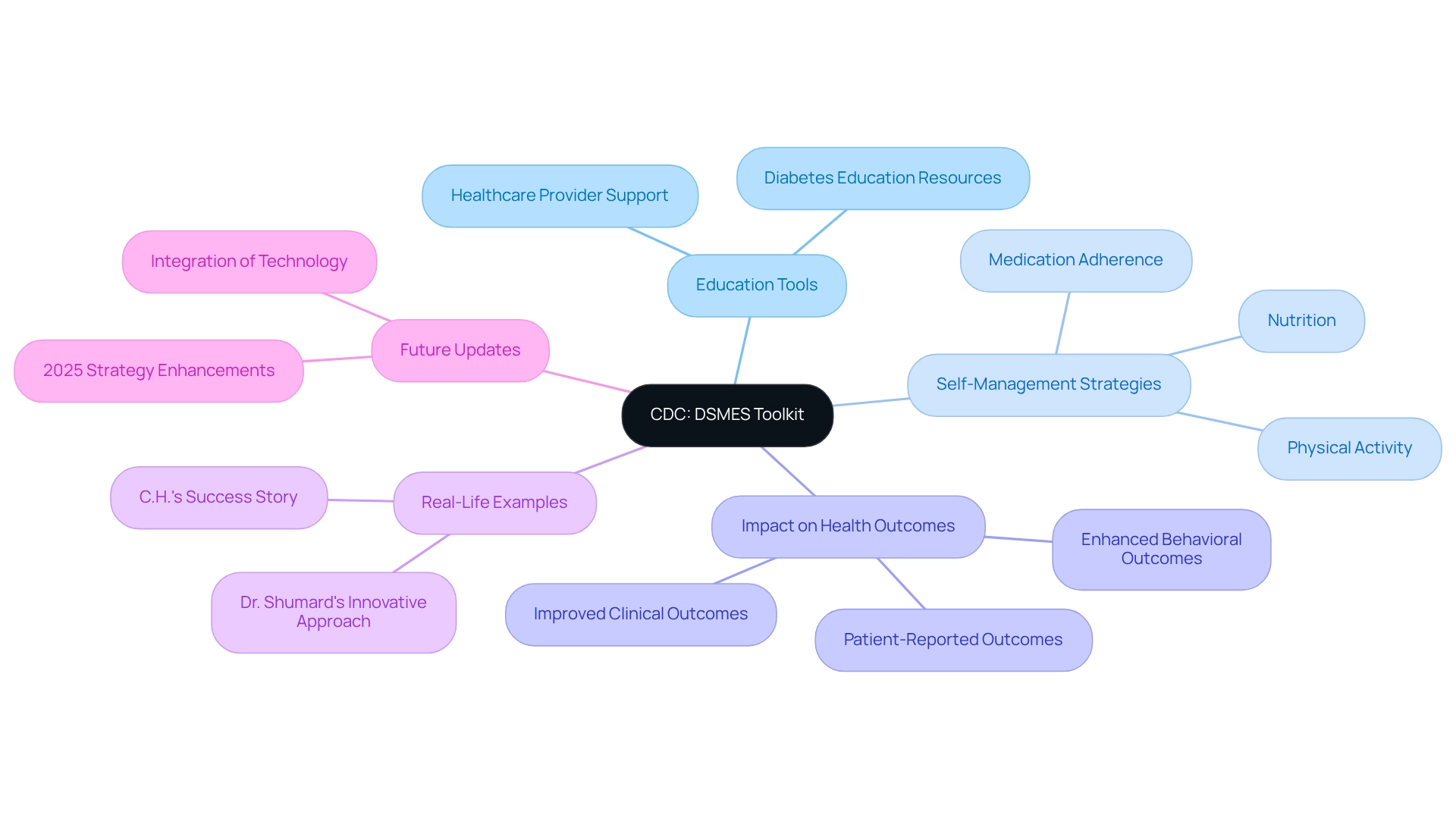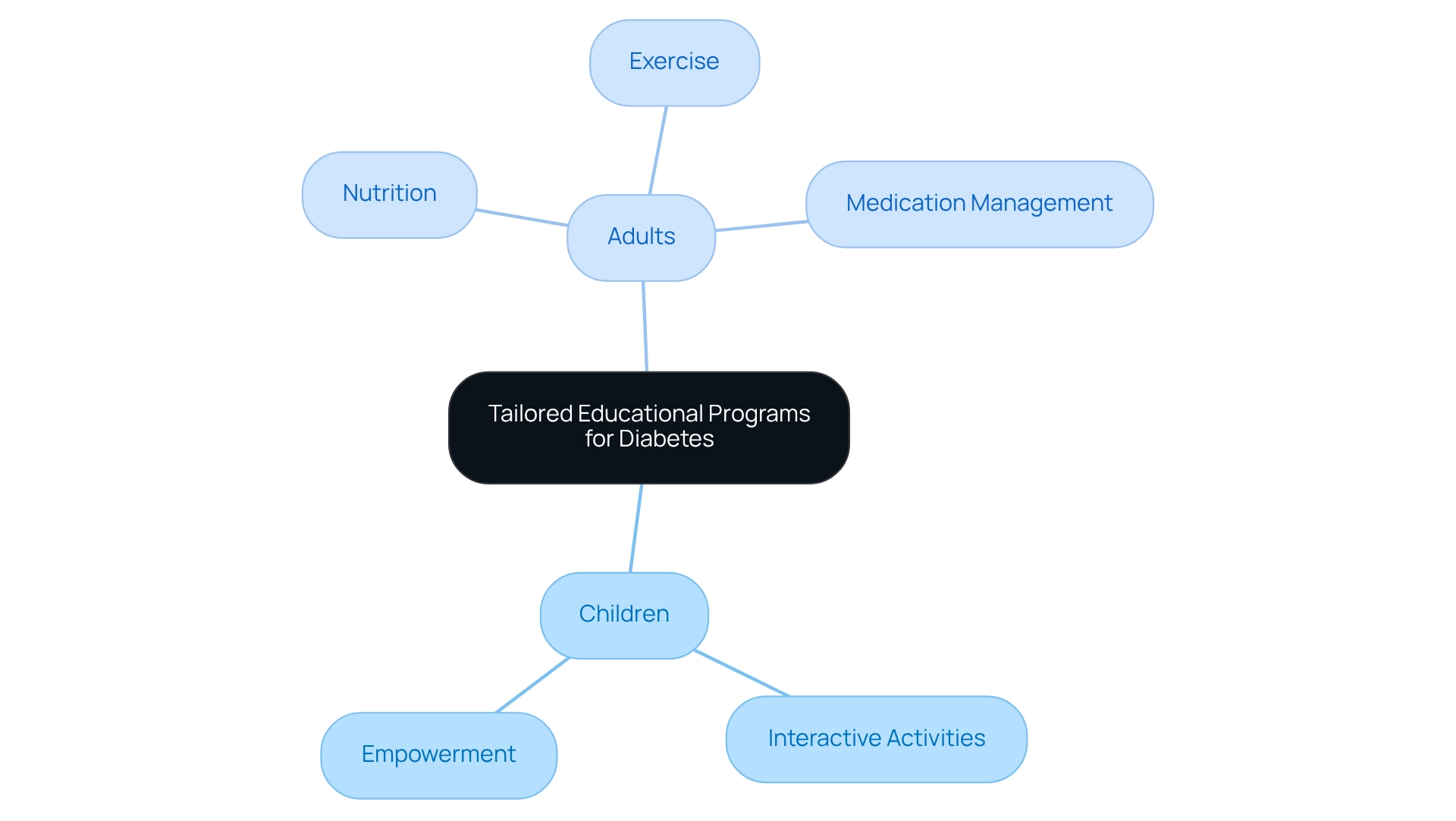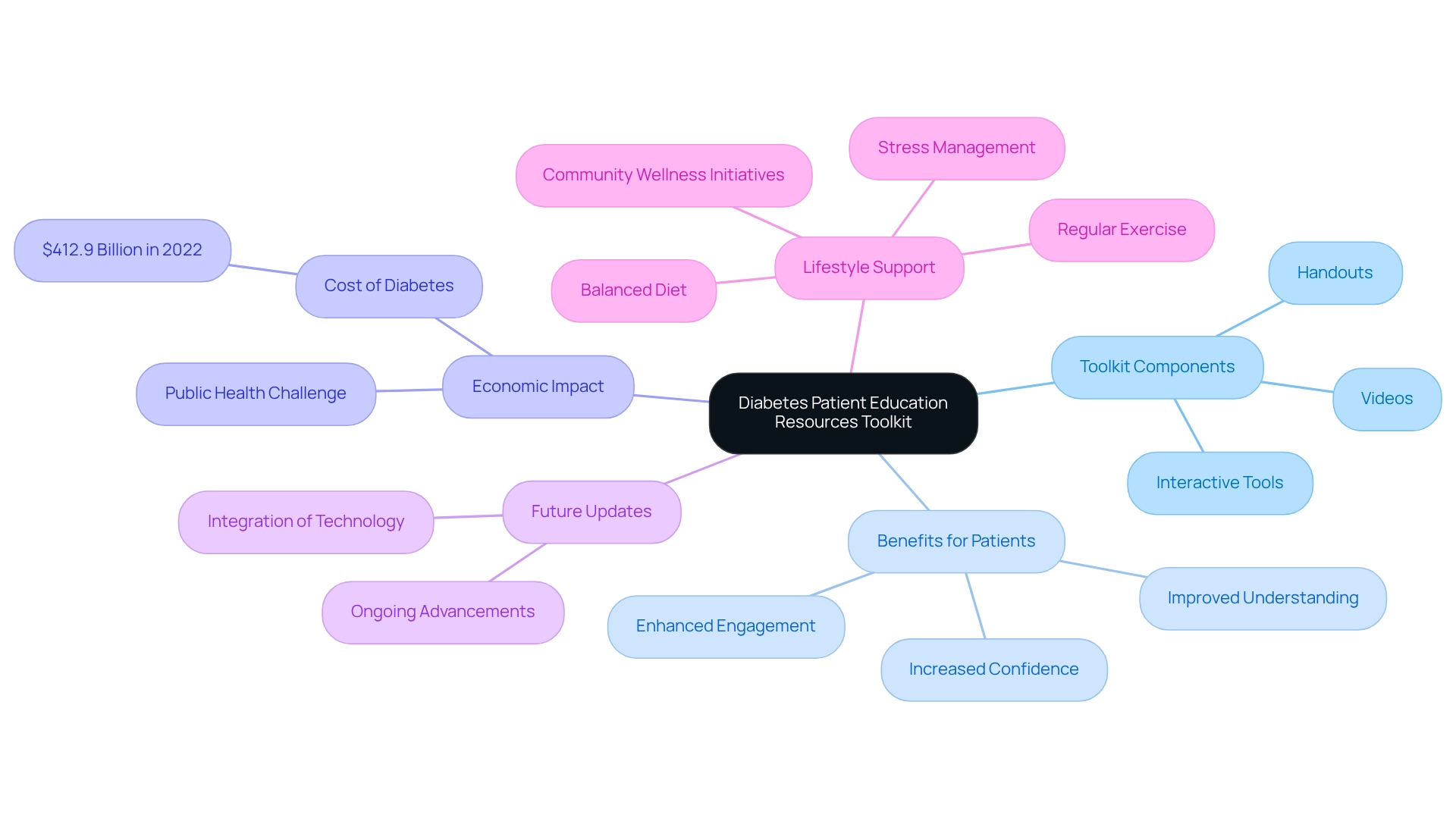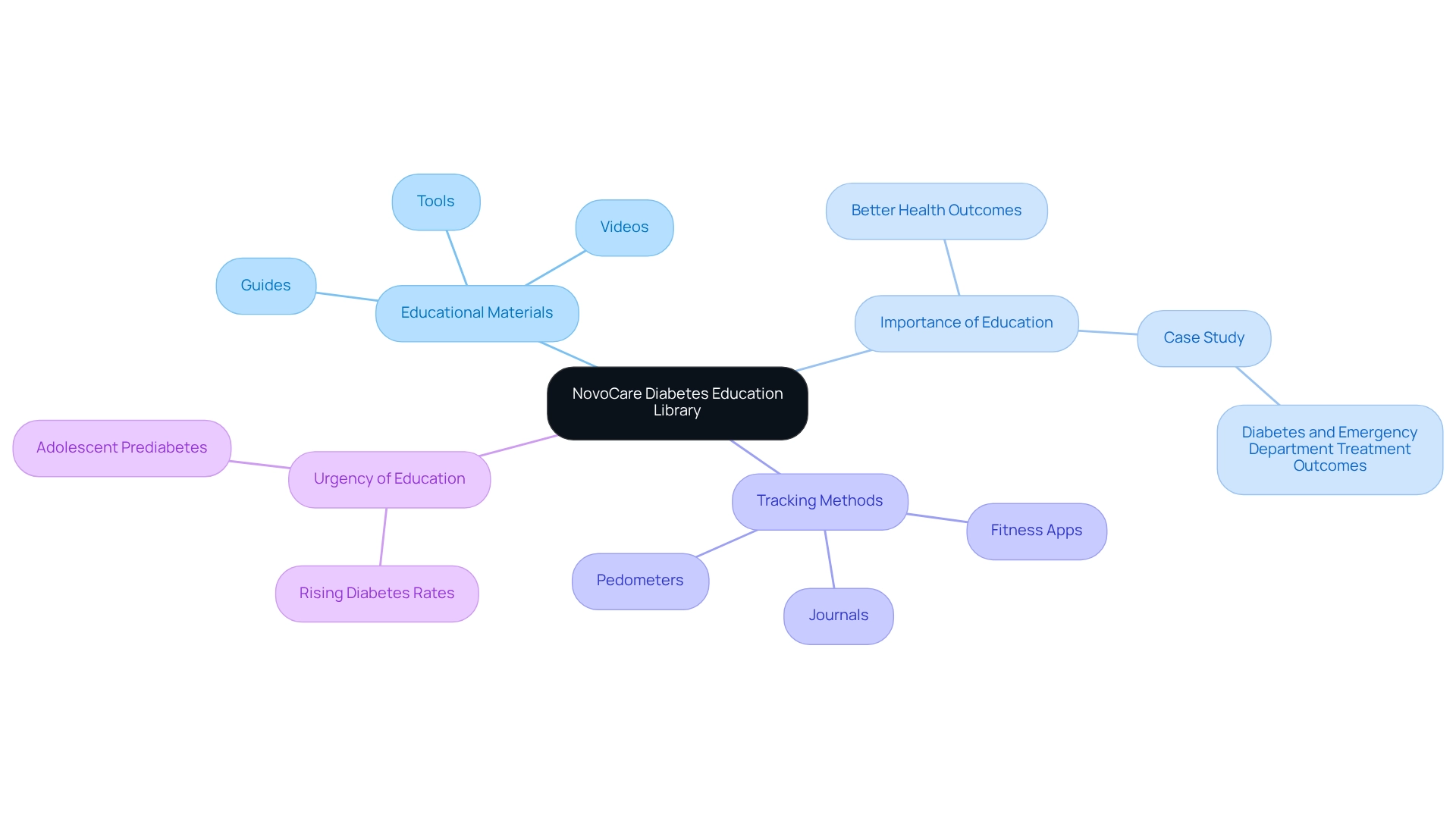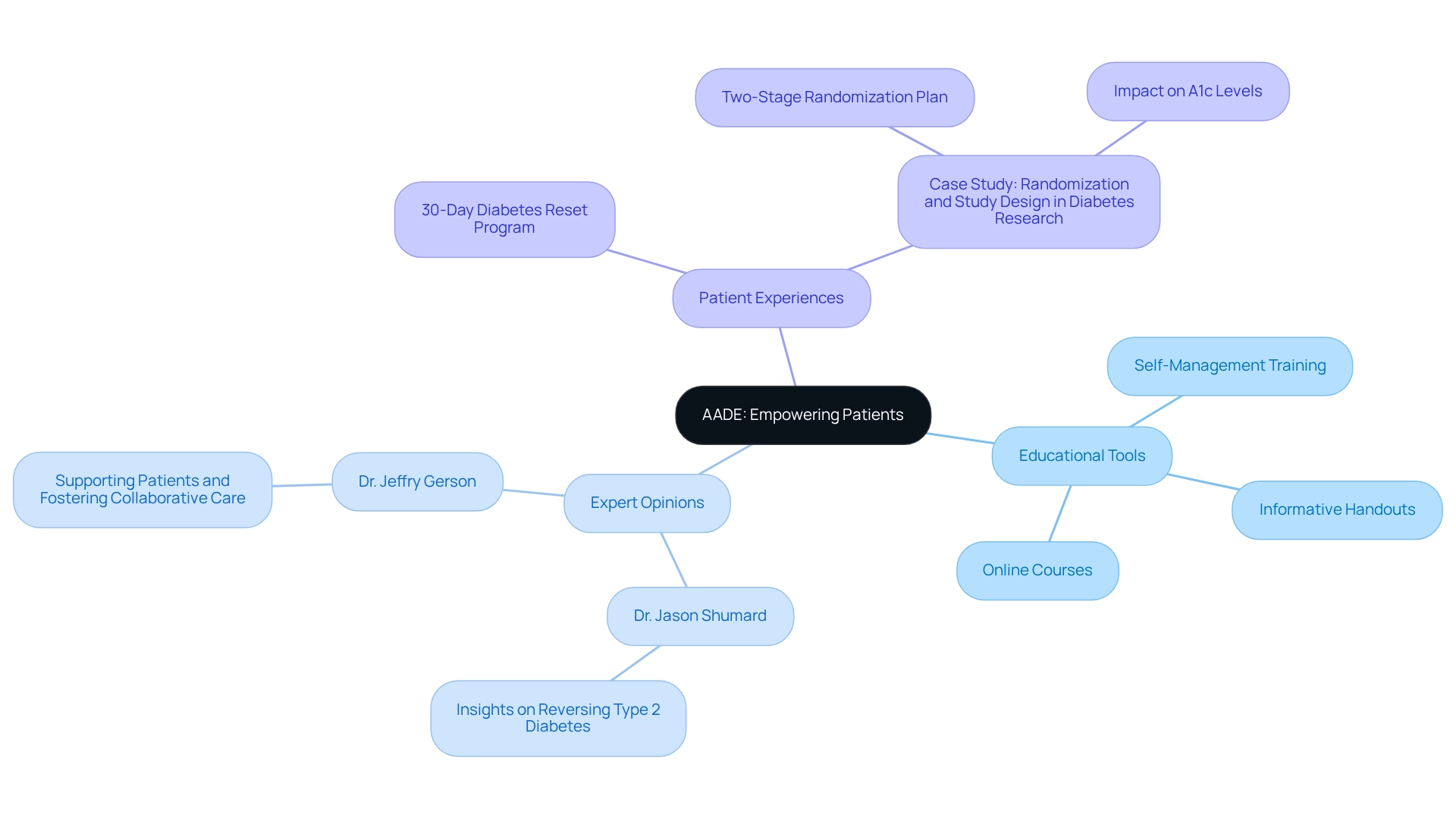Overview
The main focus of this article is to recognize the essential diabetes education tools that can significantly aid patients in managing their condition. It’s important to acknowledge the challenges that many face on this journey. Various programs and resources, such as the 30-Day Diabetes Reset Program and the CDC’s DSMES Toolkit, are highlighted for their potential to provide personalized coaching and community support. These resources offer evidence-based strategies that empower patients to enhance their self-management skills and improve their health outcomes.
Many patients find that having access to such tools not only boosts their confidence but also fosters a sense of community. Imagine being part of a supportive network where you can share your experiences and learn from others. The programs mentioned are designed to help you navigate your diabetes journey with compassion and understanding, making it easier to take proactive steps toward better health.
As you consider these options, remember that you are not alone. The 30-Day Diabetes Reset Program can be a valuable resource, guiding you through practical strategies tailored to your needs. By engaging with these tools, you can cultivate a healthier lifestyle and achieve your health goals. Embrace the opportunity to empower yourself and take charge of your diabetes management.
Introduction
In a world where diabetes is increasingly prevalent, it’s essential to acknowledge the challenges many individuals face on their health journeys. Innovative programs and resources are emerging to empower those grappling with this condition. The Integrative Wellness Center’s 30-Day Diabetes Reset Program shines as a beacon of hope, offering personalized coaching and a supportive community to help participants regain control over their diabetes management.
It’s important to recognize that navigating diabetes can feel overwhelming. However, with valuable educational resources from trusted organizations like the CDC, ADA, and AADE, patients can gain the knowledge and tools they need to manage their condition effectively. Many patients find that this combination of support and information is transformative.
This article delves into a comprehensive overview of these initiatives, highlighting how tailored education, community engagement, and proactive strategies can lead to sustainable health improvements. By fostering a renewed sense of empowerment, individuals living with diabetes can embark on a journey toward healthier living. Together, we can navigate this path with understanding and compassion.
Integrative Wellness Center: 30-Day Diabetes Reset Program for Effective Management
At the Integrative Wellness Center, we understand the challenges that come with managing diabetes. That’s why our 30-Day Diabetes Reset Program is thoughtfully crafted to provide diabetes education tools for patients, empowering you with the essential tools for effective diabetes management. This program features personalized coaching sessions led by Dr. Jason Shumard, where we focus on nutrition, physical activity, and behavior modification. Together, we’ll help you develop sustainable wellness habits that can truly transform your life.
It’s important to recognize that monitoring blood glucose levels and understanding the impact of dietary choices are crucial steps toward better health. Through our supportive community, you’ll have the opportunity to share your experiences and challenges with others who understand your journey. This communal approach not only enhances motivation but also fosters accountability among peers, making the path to wellness a shared experience.
Many patients find that early identification and intervention in blood sugar control can significantly reduce complications. Research shows that prompt treatment of diabetic kidney illness can slow the deterioration of kidney function by 33% to 37%. Moreover, as healthcare expenses related to diabetes have increased from $10,179 to $12,022 between 2012 and 2022, it’s clear that successful control programs like the 30-Day Reset Program can have a profound financial impact.
Recent discoveries highlight the effectiveness of diabetes education tools for patients in blood sugar control initiatives, demonstrating that while many self-care strategies yield positive results, tailored coaching is a vital component for improving success rates. Testimonials from participants reveal transformative experiences, with many reporting enhanced wellness metrics and a renewed sense of control over their condition. One participant shared, “I lost 55 lbs. My A1C started at 9.1 after 8 months; it is now 5.7.” This illustrates our comprehensive approach at the Integrative Wellness Center, where we incorporate diabetes education tools for patients along with community support and personalized strategies to promote lasting health improvements.
Furthermore, a case study on the effectiveness of combined interventions for managing blood sugar suggests that various modalities, including personalized coaching, can be equally beneficial for health management. We invite you to take the first step toward a healthier future with us.
CDC: Diabetes Self-Management Education and Support (DSMES) Toolkit
The CDC’s Diabetes Self-Management Education and Support (DSMES) Toolkit serves as a vital resource for individuals navigating their diabetes journey, offering important diabetes education tools for patients in conjunction with the transformative care provided by Integrative Wellness Center. This comprehensive toolkit serves as diabetes education tools for patients, providing evidence-based strategies for effective daily self-management and addressing key areas such as nutrition, physical activity, and medication adherence. It’s important to recognize that research shows only 10% of individuals who have not received education about blood sugar management adhere to at least 9 out of 10 recommended self-care practices. This highlights the necessity for structured diabetes education tools for patients. The DSMES Toolkit includes diabetes education tools for patients, designed to enhance adherence rates by equipping individuals with the knowledge and skills necessary to manage their condition effectively.
Many patients find that the diabetes education tools for patients not only offer practical advice but also underscore the crucial importance of education in improving wellness results and reducing complications linked to diabetes. By providing healthcare providers with diabetes education tools for patients, they can significantly enhance their educational offerings, empowering individuals to take charge of their health. The DSMES team plays a pivotal role in supporting individuals through problem-solving strategies, further enhancing the toolkit’s effectiveness.
Furthermore, the positive impact of diabetes education tools for patients, particularly DSMES, on blood sugar control is well-documented, with various studies highlighting improved clinical and behavioral outcomes among participants. As the toolkit evolves, updates for 2025 will enhance its strategies, ensuring it remains relevant and effective in meeting individuals’ needs. Specialists consistently promote the integration of health education into care for those with blood sugar issues, recognizing it as a fundamental aspect of effective oversight. As one researcher noted, the application of technology and telemedicine is becoming increasingly important in delivering care, especially for rural communities.
Real-life examples illustrate the effectiveness of diabetes education tools for patients, with numerous individuals reporting enhanced self-efficacy and better management of their well-being due to their engagement with these resources. For instance, C.H., who struggled with blood sugar issues for years, shared, “I was on 2 different meds that weren’t effective and was told that I needed insulin. After joining Integrative Wellness Center, I lost 55 lbs, and my A1C improved from 9.1 to 5.7.” This comprehensive approach not only fosters a deeper understanding of the condition but also incorporates diabetes education tools for patients to nurture a supportive environment where individuals can thrive in their health journeys. Moreover, Dr. Shumard’s innovative approach, highlighted in individual testimonials and case studies, aligns with the principles of the DSMES Toolkit, reinforcing the center’s commitment to effective health oversight through personalized care and comprehensive solutions.
American Diabetes Association: Comprehensive Diabetes Education Resources
The American Diabetes Association (ADA) provides various diabetes education tools for patients that focus on blood sugar regulation, including online courses, webinars, and printed materials aimed at improving management. These diabetes education tools for patients cover essential topics, from understanding blood sugar regulation to practical daily living strategies, ensuring individuals are empowered to make informed health choices. It’s heartening to note that the ADA’s diabetes education tools for patients have proven effective in enhancing outcomes for individuals, as case studies reveal significant progress in self-management abilities across diverse populations.
Many patients find it crucial to address disparities in the prevalence of diabetes, particularly with American Indians and Alaskan Natives exhibiting a 13.6% prevalence rate. This highlights the need for culturally tailored interventions. Healthcare professionals can also benefit from using diabetes education tools for patients, fostering a collaborative atmosphere that encourages client empowerment. As the landscape of education on blood sugar conditions evolves, the ADA remains at the forefront, providing diabetes education tools for patients along with the latest courses and insights to enhance understanding and approaches for both patients and providers.
Furthermore, with the recent introduction of $35 insulin copay limits in half of the states, financial assistance for blood sugar control has become more accessible. The ADA’s commitment to education is beautifully encapsulated by its CEO, who said, “That’s what the ADA has done since 1940.” Considering that around 18% of adolescents aged 12 to 18 had prediabetes from 2005 to 2016, the importance of diabetes education tools for patients and prevention strategies cannot be overstated.
In San Marcos, CA, embracing a holistic lifestyle—integrating regular exercise in the area’s stunning parks, a nutritious diet rich in local produce, and community support through wellness initiatives—can significantly enhance health control. Personalized guidance from healthcare professionals, like Dr. Jason Shumard, empowers patients to make effective lifestyle changes, addressing risks linked with conventional treatments, such as the potential for increased insulin resistance due to insulin injections, while focusing on tailored nutrition and functional medicine approaches.
Community wellness initiatives are vital in providing support and resources, such as diabetes education tools for patients, helping individuals navigate their journey with diabetes effectively. Remember, you are not alone in this journey; there are resources and people ready to support you every step of the way.
Joslin Diabetes Center: Tailored Educational Programs for All Ages
At the Integrative Wellness Center, we understand that managing health can be challenging, which is why we offer a range of tailored educational programs designed for individuals of all ages, from children to adults. These programs are thoughtfully crafted to address the unique challenges associated with blood sugar control throughout different life stages. For instance, children engage in interactive activities that not only make learning about health enjoyable but also instill a sense of empowerment early on. Meanwhile, adults benefit from comprehensive education covering essential topics like nutrition, exercise, and medication management, equipping them with the knowledge necessary to navigate their health challenges.
It’s important to recognize that diabetes education tools for patients designed for specific age groups have been shown to significantly enhance patient outcomes. Research indicates that customized programs can improve A1c levels among participants, demonstrating their effectiveness in managing blood sugar. A study by Turner and colleagues revealed that health condition education programs can lead to $815 in direct cost savings and $1504 in indirect cost savings, underscoring the financial benefits of such initiatives. Many patients find that personalized educational approaches meet their diverse needs, and our educators at the Integrative Wellness Center are dedicated to this mission. This commitment to tailored diabetes education tools for patients not only aids individuals in controlling their diabetes but also promotes lifelong wellness habits.
Real-life examples from our center highlight the positive impact of these educational initiatives. Children participating in these programs often express increased confidence in managing their condition, while adults report a better understanding and control over their well-being. Dr. Jason Shumard notes, “By providing individuals with actionable insights and practical tools, we create an environment where they can reclaim their health and well-being, ultimately leading to an improved quality of life and reduced reliance on traditional medical interventions.” By focusing on the distinct needs of each age group, we ensure that everyone receives the essential support required to thrive with their condition. Additionally, healthcare professionals play a vital role in encouraging participation in these education programs, further enhancing their effectiveness.
Diabetes Canada: Essential Tools and Resources for Diabetes Management
Diabetes Canada provides a variety of essential diabetes education tools for patients and resources designed to support individuals managing their condition. It’s important to recognize that dealing with diabetes can be challenging, and these diabetes education tools for patients—including meal planning guides, exercise recommendations, and educational materials—are here to help you better understand your health. By providing practical strategies for effective management, including the adoption of SMART goals—specific, measurable, attainable, relevant, and time-bound—these resources empower you to take charge of your well-being with renewed focus and motivation.
Recent statistics reveal a concerning surge in diabetes prevalence, largely due to rising obesity rates and sedentary lifestyles. Many patients find that accessing Diabetes Canada’s diabetes education tools for patients encourages a proactive approach to managing their condition. For instance, meal planning resources not only help you make informed food choices but also significantly influence blood sugar management, leading to improved overall well-being.
A compelling case study titled ‘Patient Empowerment through Education’ highlights the positive impact of these resources. Individuals who engaged with the diabetes education tools for patients provided by Diabetes Canada reported increased confidence in managing their health. This empowerment is reflected in testimonials from individuals who have successfully used diabetes education tools for patients to improve their quality of life. Additionally, insights from specialists at Diabetes Canada highlight the significance of patient engagement with these care tools. It’s observed that those who actively engage in their treatment often achieve better health outcomes. By making diabetes education tools for patients readily available, Diabetes Canada fosters an environment where you can thrive on your health journey. The financial implications of managing diabetes are substantial, with average medical costs for diagnosed individuals being 2.6 times higher than those without the condition. This underscores the necessity of effective management tools.
Regularly reviewing your progress not only promotes accountability but also allows you to adapt your goals as your fitness levels change. This practice ultimately enhances your overall health outcomes. Remember, you are not alone in this journey; with the right support and resources, you can navigate the challenges of diabetes and work towards a healthier future.
Cardi-oh.org: Diabetes Patient Education Resources Toolkit
At the Integrative Wellness Center, we understand the challenges faced by individuals dealing with blood sugar issues. That’s why we’ve created a comprehensive Resources Toolkit that includes diabetes education tools for patients, designed to empower both healthcare providers and individuals in managing their condition effectively. This toolkit provides a variety of diabetes education tools for patients, including handouts, videos, and interactive tools, all aimed at enhancing your understanding of blood sugar management. By equipping healthcare providers with these valuable resources, we strive to improve the quality of blood sugar management and bolster individual self-management efforts.
It’s important to recognize that healthcare education plays a crucial role in effective management. Recent statistics reveal that 8.0% of U.S. adults diagnosed with a blood sugar condition have a non-HDL level of 190 mg/dL or higher. This underscores the need for effective management strategies and highlights the significance of diabetes education tools for patients included in our toolkit. These resources are designed to help you better comprehend your condition and manage it more effectively.
Moreover, the economic burden of diabetes is substantial, with costs soaring to $412.9 billion in 2022. This reality emphasizes the urgency for effective management strategies, making our toolkit a vital resource for both individuals and clinicians. Not only do diabetes education tools for patients assist clinicians in enhancing client understanding, but they also foster greater involvement in treatment plans—an essential component for achieving successful outcomes. Many patients find that real-life examples illustrate the toolkit’s positive impact. Numerous individuals have reported increased confidence in managing their condition after utilizing these resources. For instance, clinicians using the Integrative Wellness Center resources have observed significant improvements in client engagement and adherence to treatment plans. Expert opinions affirm that comprehensive diabetes education tools for patients are crucial for improving care, as they provide practical insights that empower individuals to take charge of their well-being.
As we look ahead to 2025, updates to the Integrative Wellness Center’s diabetes education tools for patients will reflect ongoing advancements in managing blood sugar conditions. This ensures that both clinicians and individuals have access to the latest diabetes education tools for patients and information. Many patients find that the integration of interactive elements within the toolkit significantly enhances their engagement and understanding, ultimately leading to better health outcomes. Furthermore, the increasing recognition of technology and telemedicine as beneficial methods for providing care, especially in rural areas, further elevates the significance of diabetes education tools for patients in contemporary health education.
To further support your journey in controlling blood sugar levels, Dr. Jason Shumard’s book, ‘How To Reverse Your Diabetes,’ serves as a straightforward guide, alongside diabetes education tools for patients, to unlocking the secrets of healing type 2 conditions. We encourage you to attend local events where you can receive this book for free, adding valuable resources to your toolkit. Engaging in lifestyle changes—such as participating in community wellness initiatives, visiting local farmers’ markets for fresh produce, and enjoying outdoor activities—can greatly enhance your health control in San Marcos, CA. By focusing on a balanced diet, regular exercise, and stress management, you can effectively regulate your blood sugar levels and improve your overall well-being.
NIDDK: Comprehensive Information and Resources for Diabetes Patients
The National Institute of Diabetes and Digestive and Kidney Diseases (NIDDK) provides a wealth of diabetes education tools for patients who are navigating the challenges of diabetes. Understanding your condition can feel overwhelming, but the NIDDK offers essential diabetes education tools for patients regarding prevention, care, and potential complications. Their website serves as a comprehensive hub, empowering you to make informed decisions about your health and well-being. By engaging with these resources, you can deepen your understanding and adopt effective management strategies that resonate with your lifestyle.
It’s important to recognize that patient education is at the heart of the NIDDK’s mission. Their commitment shines through in the high quality and accessibility of their materials, designed to support you on your health journey. This dedication is particularly crucial, especially when considering that between 2012 and 2022, the excess medical costs linked to diabetes increased significantly, from $10,179 to $12,022 per person. Such figures underscore the urgent need for effective oversight and prevention strategies, which can be fostered through comprehensive education.
Many patients find that diabetes education tools for patients, which offer actionable insights and practical tools, can transform their experience. As Dr. Jason Shumard eloquently states, “By providing patients with actionable insights and practical tools, the center fosters an environment where individuals can reclaim their health and well-being.” However, it’s essential to acknowledge that traditional treatments for blood sugar regulation, such as insulin injections, may inadvertently worsen insulin resistance, complicating your management efforts.
This highlights the importance of a holistic approach to managing diabetes-related health. Customized functional medicine strategies, including personalized nutrition and testing, can be vital in your journey. Expert insights from the NIDDK emphasize that informed individuals are better equipped to navigate their health challenges, ultimately leading to improved outcomes and a higher quality of life. Remember, you are not alone on this journey, and with the right support and resources, you can take meaningful steps toward better health.
Stability Health: Shareable Diabetes Education Resources for Clinicians and Patients
Dr. Jason Shumard provides a wide array of diabetes education tools for patients, tailored for both healthcare professionals and individuals. These resources include infographics, educational videos, and printable materials, all crafted for easy distribution in clinical settings. Dr. Shumard aims to enhance understanding of managing blood sugar levels by providing diabetes education tools for patients, ultimately fostering better communication between healthcare providers and their clients.
This initiative not only elevates healthcare education but also equips clinicians with effective strategies to deliver high-quality care, highlighting the urgent need for diabetes education tools for patients in light of 1.2 million new diabetes diagnoses in 2021 and a significant rise in diabetes prescriptions in recent years. Many patients find that the combination of infographics and videos is particularly beneficial, as these formats simplify complex information, making it easier to grasp.
As Dr. Jason Shumard emphasizes, ‘By providing patients with actionable insights and diabetes education tools for patients, the center creates an environment where individuals can reclaim their health and well-being.’ This comprehensive approach underscores the vital role of diabetes education tools for patients in effectively managing blood sugar levels.
Furthermore, Dr. Shumard’s book, ‘How To Reverse Your Diabetes,’ serves as a straightforward guide utilizing these tools for addressing type 2 blood sugar challenges. Participants of our events receive a complimentary copy as a token of appreciation for their involvement. Insights gathered from individual perspectives within team-based healthcare further highlight the importance of clear communication and collaboration in enhancing outcomes. Transformative experiences shared by individuals who have taken part in Dr. Shumard’s 30-Day Reset program illustrate the potential for reversing type 2 conditions and improving overall well-being.
Are you ready to take the first step toward a healthier life? Join us in this journey and discover how you can make a difference in your health today.
NovoCare: Comprehensive Diabetes Education Library
NovoCare offers a comprehensive education library on blood sugar management, serving as a vital resource for both individuals and healthcare professionals. This library includes a variety of materials, such as educational guides, instructional videos, and diabetes education tools for patients, all designed to address the many facets of diabetes management. By providing access to these resources, NovoCare empowers individuals to take charge of their well-being while equipping healthcare providers with essential tools to support their clients effectively.
It’s important to recognize that thorough education is crucial; research indicates that individuals who are well-informed are more likely to achieve better health outcomes. For instance, data from emergency room visits reveals that prompt and effective education on blood sugar management can significantly impact treatment results, with many individuals experiencing improved control of their conditions. A case study titled “Diabetes and Emergency Department Treatment Outcomes” shows that a notable percentage of those treated in emergency departments managed their conditions more effectively after receiving proper education.
Furthermore, incorporating diabetes education tools for patients has been shown to enhance individuals’ understanding of diabetes management, fostering a proactive approach to their health. As we look towards 2025, the library continues to evolve, integrating the latest educational resources and professional insights, highlighting the importance of ongoing learning in the journey toward better health. Dr. Jason Shumard emphasizes, “By offering patients actionable insights and practical tools, the center creates an environment where individuals can reclaim their wellness and well-being.”
To effectively monitor and improve progress in managing blood sugar levels, individuals are encouraged to explore various tracking methods, including fitness apps, journals, and pedometers. For example, fitness apps can assist in tracking daily steps and caloric intake, while journals provide a space for reflection on dietary choices and emotional health. Setting SMART goals—specific, measurable, attainable, relevant, and time-bound—can significantly enhance focus and motivation. Regularly reviewing one’s progress not only promotes accountability but also allows for the adjustment of goals in response to changing health conditions.
With the incidence of type 2 diabetes mellitus rising significantly across all racial and ethnic groups from 2002 to 2018, the need for thorough education on this condition has never been more urgent. Additionally, approximately 18% of adolescents aged 12 to 18 were found to have prediabetes from 2005 to 2016, underscoring the importance of early education and intervention. The NovoCare library not only addresses these pressing needs but also offers diabetes education tools for patients with type 2 diabetes to enhance their coping strategies. One patient shared, “The resources provided by NovoCare have transformed my understanding of managing the condition, allowing me to take control of my health like never before.
AADE: Empowering Patients with Educational Tools and Resources
The American Association of Diabetes Educators (AADE) offers a comprehensive range of diabetes education tools for patients and resources aimed at empowering individuals living with diabetes. These diabetes education tools for patients consist of self-management training programs, informative handouts, and interactive online courses that address the essential aspects of managing this health condition. By focusing on individual empowerment, the AADE enhances knowledge and skills, enabling individuals to effectively manage their health journey.
It’s important to recognize that many individuals face challenges in managing their condition. Recent statistics reveal that 94% of researchers rate AADE’s educational articles as excellent or good, highlighting their quality and relevance. These resources are designed not only to enhance personal education but also to encourage active involvement in managing chronic conditions, which is vital for achieving better wellness outcomes.
Many patients find that alongside AADE’s resources, Dr. Jason Shumard’s thorough manual on reversing type 2 diabetes offers valuable insights and free materials, including his book, available at events. This holistic approach emphasizes lifestyle changes that empower individuals to take charge of their health. Expert opinions from the AADE underscore the importance of diabetes education tools for patients in helping individuals regulate their blood sugar levels. These programs have shown significant success in practical applications, as illustrated by a recent study titled ‘Randomization and Study Design in Diabetes Research.’ This study, which utilized a two-stage randomization plan, revealed effective management strategies that can lead to improved A1c levels.
Moreover, diabetes education tools for patients serve as vital resources that individuals can reference, reinforcing the information learned during training sessions. Dr. Jeffry Gerson emphasizes, “Supporting Individuals and Fostering Collaborative Care,” highlighting the importance of individual support in managing blood sugar conditions. By providing accessible and practical information, the AADE fosters an environment where individuals can thrive, ultimately leading to improved health outcomes and a greater sense of control over their management.
Additionally, the transformative experiences of patients who have participated in Dr. Shumard’s 30-Day Diabetes Reset program further demonstrate the effectiveness of a holistic approach to reversing type 2 diabetes and enhancing overall well-being. Are you ready to take the first step toward a healthier you?
Conclusion
Empowering individuals with diabetes is essential in navigating the complexities of this condition. The Integrative Wellness Center’s 30-Day Diabetes Reset Program stands as a beacon of hope, demonstrating how personalized coaching, community support, and education can transform lives. Through tailored coaching and practical resources, participants discover proactive ways to manage their health, leading to meaningful improvements in their diabetes metrics and overall well-being.
It’s important to recognize that educational initiatives from reputable organizations like the CDC, ADA, and AADE play a vital role. These resources provide essential knowledge and tools that enable patients to take charge of their health journeys. Many patients find that the integration of these educational frameworks with community-driven support creates an environment where they feel empowered to make informed decisions about their diabetes management.
As the prevalence of diabetes continues to rise, the need for effective management strategies becomes increasingly urgent. Programs that prioritize education, community engagement, and personalized care are crucial in addressing the challenges posed by this condition. By embracing these comprehensive approaches, individuals can reclaim their health, leading to sustainable lifestyle changes and improved quality of life. The collective efforts of healthcare providers and supportive communities pave the way for a brighter future for those living with diabetes.
Frequently Asked Questions
What is the 30-Day Diabetes Reset Program offered by the Integrative Wellness Center?
The 30-Day Diabetes Reset Program is designed to provide diabetes education tools, personalized coaching sessions, and support focused on nutrition, physical activity, and behavior modification to empower patients in managing their diabetes effectively.
Who leads the coaching sessions in the 30-Day Diabetes Reset Program?
The coaching sessions are led by Dr. Jason Shumard, who guides participants in developing sustainable wellness habits.
Why is monitoring blood glucose levels important in diabetes management?
Monitoring blood glucose levels and understanding dietary choices are crucial for better health and can significantly reduce complications related to diabetes.
How does the program foster community support among participants?
The program encourages sharing experiences and challenges with others, enhancing motivation and accountability through a supportive community.
What impact can early intervention in blood sugar control have on health?
Early identification and intervention can slow the deterioration of kidney function and reduce complications, which is vital for overall health management.
How has healthcare spending related to diabetes changed from 2012 to 2022?
Healthcare expenses related to diabetes have increased from $10,179 to $12,022 during that period, highlighting the financial impact of effective control programs.
What role do diabetes education tools play in blood sugar control?
Diabetes education tools are essential for improving self-care strategies and enhancing success rates in managing blood sugar levels.
Can you provide an example of a participant’s success from the program?
One participant lost 55 lbs and improved their A1C from 9.1 to 5.7 after engaging with the program, illustrating its effectiveness.
What is the CDC’s Diabetes Self-Management Education and Support (DSMES) Toolkit?
The DSMES Toolkit is a resource that offers evidence-based strategies for effective daily self-management of diabetes, covering nutrition, physical activity, and medication adherence.
How does the DSMES Toolkit enhance adherence to self-care practices?
It equips individuals with the necessary knowledge and skills, significantly improving adherence rates among those managing diabetes.
What are some key areas of focus in diabetes education tools provided by the American Diabetes Association (ADA)?
The ADA’s tools cover blood sugar regulation, practical daily living strategies, and aim to empower individuals to make informed health choices.
How does the ADA address disparities in diabetes prevalence among different populations?
The ADA emphasizes the need for culturally tailored interventions, particularly for groups with higher prevalence rates, such as American Indians and Alaskan Natives.
What recent changes have been made regarding insulin costs?
A $35 copay limit for insulin has been introduced in half of the states, making financial assistance for blood sugar control more accessible.
How can community wellness initiatives support individuals with diabetes?
Community initiatives provide resources and support, helping individuals navigate their diabetes journey effectively and fostering a sense of belonging.
